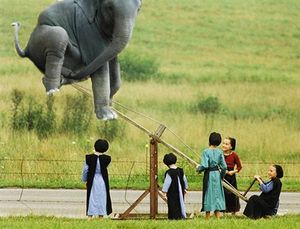
"Though the problems of the world are increasingly complex, the solutions remain embarrassingly simple."
Bill Mollison
Template:Walden Ecovillage nav box
Mission
To responsibly develop, manage and rejuvenate all natural resources to which we have access, in order to provide for the immediate and long-term needs of our community and the ecosystem on which it depends.
Overview
The farm is not a plot of land placed somewhere on campus for the purpose of growing vegetables and raising animals. Instead, our farm consists of all of the land and natural resources to which the community has access. The Agricultural College, within the Ecoversity, is responsible for managing and developing these resources, and for conducting research and education activities related to environmentally sound natural resource management and sustainable development.
Sustainable Self-sufficiency
We have outlined our justification for sustainable self-sufficiency on the Businesses page. Our strategic development plan prioritizes developing the capacity to feed ourselves and building infrastructure with on-site resources; so we will (prudently) strive to balance development with our self-sufficiency objective.
Our approach to Sustainable agriculture is based on Permaculture, and includes Masanobu Fukuoka's, Natural Farming and Allen Savory's, Holistic Management. We will, through experimentation, continuously work to validate and improve on those systems, and then share those findings with the global community. Christopher Alexander's work in architecture and design will likewise have a significant impact on the design of our infrastructure: particularly with regard to layout and aesthetics. These comprehensive systems are sufficiently developed to provide us with the tools we need to design and plan the infrastructure, and begin development of our community.
Form & Function
Our Permaculture design plan will integrate: Agroforestry; Mycology; Ecological Aquaculture, Microponics and Aquaponics; and a variety of animals. Animals will be raised for their contribution to our agricultural practices, for slaughter, for eggs and dairy products and for recreation; our horses (or donkeys) will be available to Members and Resort guests for transportation and recreation. Members will not keep pets.
The Farm will provide year-round organic produce, meat and fish, eggs, dairy products, processed foods (e.g. syrups, canned and pickled foods, soy products etc.), non-timber forest products and biomass to Walden Ecovillage and our Guests, and for sale to the outside community. The Farm's retail operations will likely include a produce market, a health food store, a nursery and a lumber yard.
Hamlets & Food
It is likely that our community housing will be organized as a network of small 'Hamlets' (see Infrastructure) that surrounds the main campus (the Ecoversity, Wellness Resort, our larger scale farming operations [Zone3] and ancillary businesses). Each Hamlet will produce the majority of its own food by collectively maintaining small agricultural facilities (Zone1[s]), that are encircled by the housing units; their surplus production will be contributed to the Ecovillage.
Obviously, this functionality will not provide all of the Hamlet's food; the common agricultural facilities (Zones 2, 3 & 4) will supplement their diet. We intend to eat together, as a community, as often as possible (likely via festivals: a superstructural function) but Members will routinely eat in the housing units (each unit will include a common kitchen) or where ever they are at mealtimes (e.g. picnics, pot-lucks or bag lunches at work, meetings etc.).
Spirituality & Farming
"One basic way to expand our efficacy is through modern science and technology. But another is through integrated (emotional, mental, physical, and spiritual) growth and enhanced wisdom. This means growing in our sense of connection with nature and one another and learning to live in ways that naturally cultivate our capacity to be human."
Peter Senge
Communal farming is one the primary sources for experiencing spirituality at Walden. We hold that by engaging in this collective, creative, nurturing and physical activity, every one of us will maintain a connection (in both time and space) to the earth, exercise our bodies in the fresh air, and simultaneously witness the humanity in each other. To that end, every Member will become familiar with, and participate in, the production of our food.
Discuss the content on this page
Discuss any section of this page here:[[1]]

